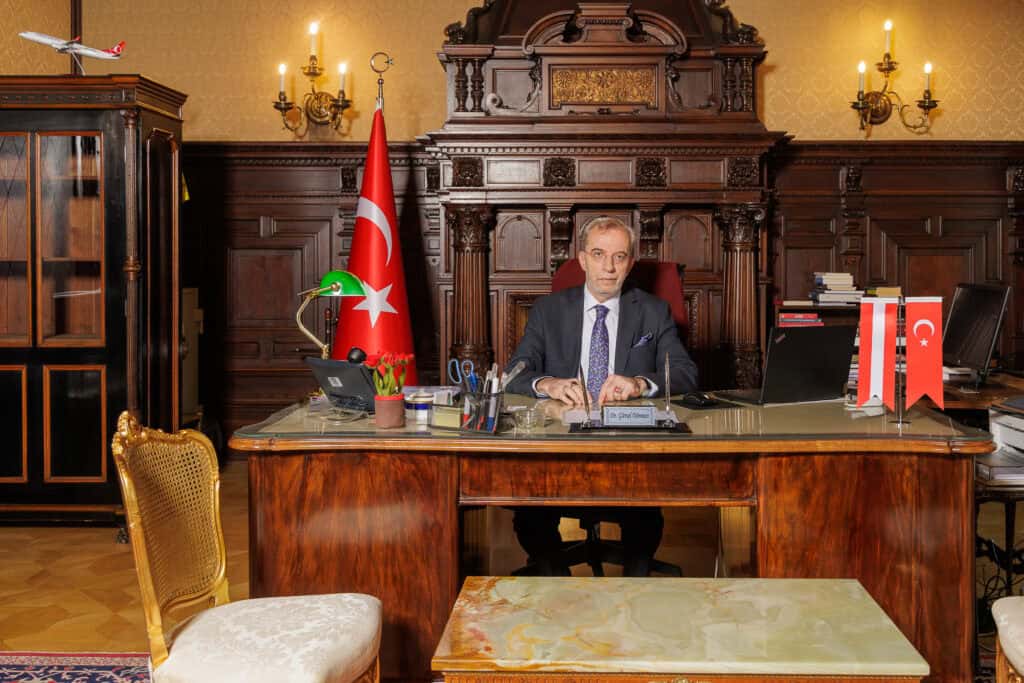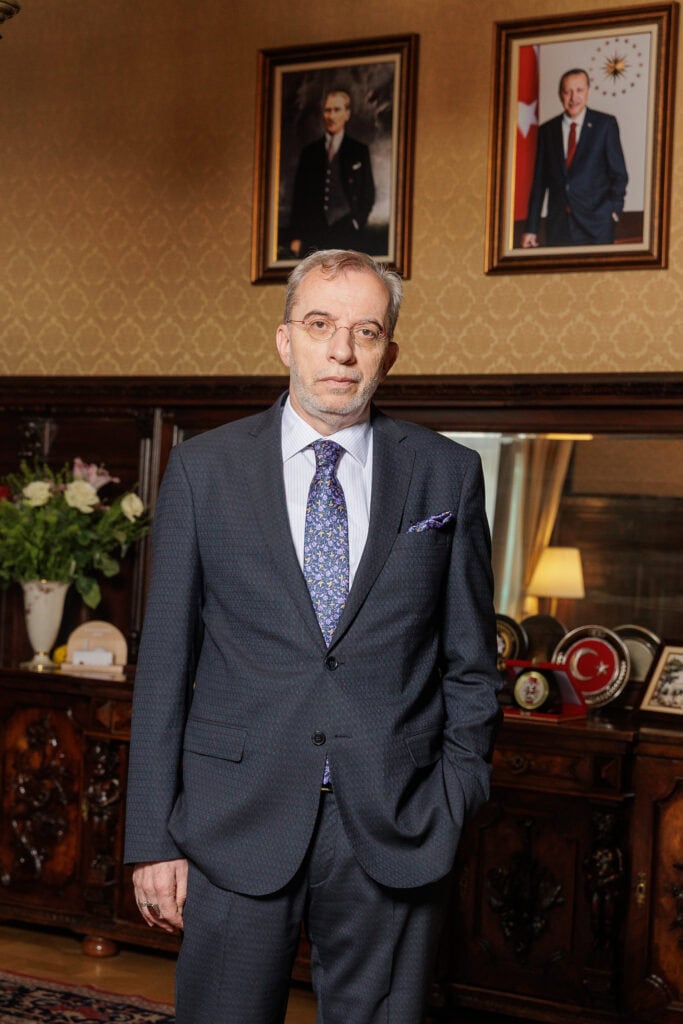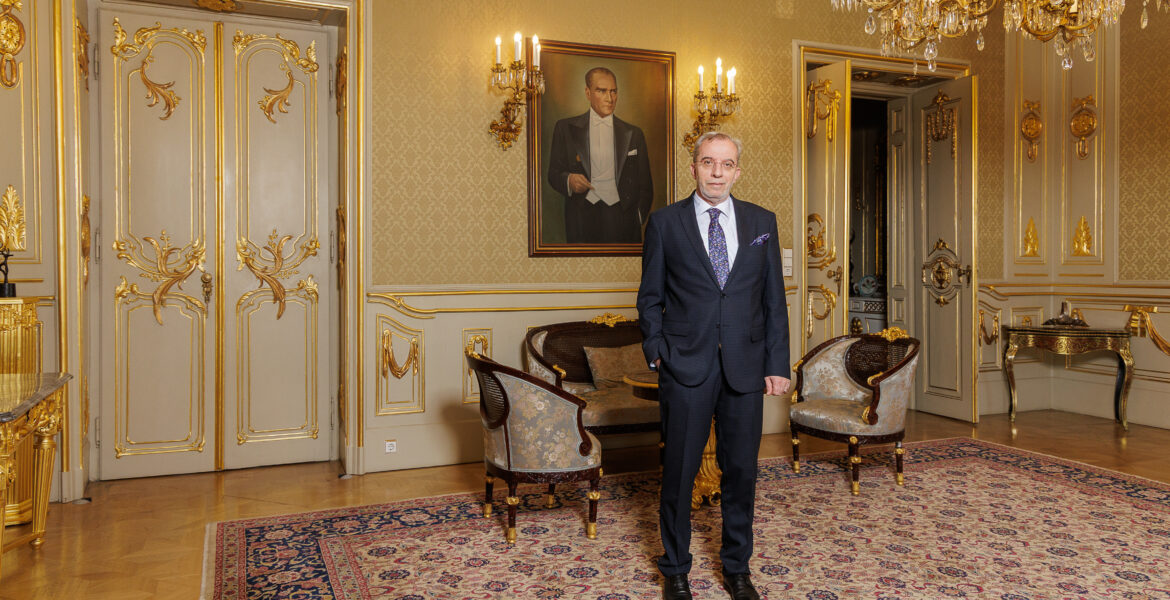The Diplomatic SOCIETY Magazine sat down with the Ambassador of Türkiye to Austria, H.E. Gürsel Dönmez, and spoke about his long-lasting connection with Austria, Türkiye’s role as mediator and its relation with the EU.
You have long-lasting connections to Austria – can you tell us a bit about them? How do they help you in your job as Ambassador of Türkiye to Austria?
That is correct. Although I have spent most of my life in Türkiye, Vienna is the single city where I stayed the longest. I lived 22 years here. I came to this beautiful city back in 1987 to study. I had finished my undergraduate studies in Political Science at the University of Ankara and I wanted to follow-up with a Master’s degree in Vienna. I completed my graduate studies at the Vienna Economic University in 1992. Later, in 1999, I obtained a doctoral degree. Then I started working as an instructor and lecturer in different education institutions in Vienna. At the same time, I engaged myself in civil society organizations of the Turkish community in Austria. By that time, I had become an “Austro Turk” myself! Finally, in 2009, I followed the call to return back to Ankara to work in public service. There, the Turkish communities in Europe remained one of my primary areas of interest.
So, as you mentioned, I have long-lasting and strong connections to Austria – to the Turkish community in Austria in specific and the Austrian society in general as well as to Austrian private and state institutions. During my presence, I witnessed important landmarks of Austrian history such as the fall of the Iron Curtain and the Austrian accession to the EU. I felt personally how these developments had tremendous effects on Austria in the 1990s and 2000s. I observed at first-hand how the Turkish community in Austria became an integral part of the Austrian society, how its members contribute to the welfare and richness of Austria and how the second and third generations of Austro Turks became to identify themselves with both countries simultaneously.
These are all experiences that help me in my current endeavor to strengthen the Turkish-Austrian friendship.
The relations between Austria and Türkiye have been rocky at times – how would you like to strengthen these connections and what are the most pressing issues?
Turkish-Austrian relations date back centuries. We had times of war and times of peace and cooperation. During the First World War, the Ottoman Empire and the Austrian-Hungarian Empire were Allies. In 1924, our newly established Republics signed a Treaty of Friendship. In 1964, our countries concluded the Labor Force Agreement which paved the way for the migration of Turkish workforce to Austria. This Treaty thus laid the ground for the presence of the Turkish community in this country. On the other hand, it is true that in the recent decade or two, there were instances where the two countries had diverging positions on some issues – mostly in connection with Türkiye’s EU-membership process. However, despite rough waters, we navigated successfully. Dialogue always persisted. In the recent years we have seen a real rapprochement between our both countries. Our leaders and ministers are in regular contact. Trade relationships are strong. The Austro Turks are an important bridge. Hundreds of thousands of Austrians visit Türkiye every year. We have so many common interests and cooperation opportunities. Not least the current regional and global reality necessitates that we work closely together in all fields.


Türkiye’s EU accession process is on ice, what is your personal outlook for EU-Türkiye relations? Is it still a priority for your country to become a part of the EU?
I wouldn’t say that Türkiye’s accession process is on ice. I would say its deadlocked. It is deadlocked due to the political blockages of some member states and the Cyprus issue.
Once political considerations take the stage, there is bound to be hurdles in the process. Türkiye has been a candidate country for the EU membership since 1999. Until today, in Türkiye’s EU accession negotiations, 16 chapters are opened whereas one chapter is temporarily closed. This is not a result of Türkiye’s inability to meet EU criteria. As I said, its a political blockage.
Membership to the EU is still a strategic priority for Türkiye, however, it must be understood that the membership process has always been a tool to bring Türkiye in line with EU standards. It has always been a catalyst for the reform process in the country. On the other hand, as a candidate country for more than 25 years, whatever the Government is striving to achieve, it is doing for the good of the people and we have come a long way, with or without a membership perspective.
Nowadays Türkiye’s relations with the EU is a two way process, as much as Türkiye once needed the EU, the EU now needs Türkiye, especially at the current conjuncture we are going through. We have been witnessing the erosion of multilateralism and universal values.
In this backdrop, Türkiye is implementing a foreign policy not only in the interest of Türkiye and its citizens’, but also to create conditions for sustainable peace for our neighbourhood and beyond.
It is well-known that Türkiye has a leading role in conflict prevention, peaceful resolution of conflicts and mediation. Making the global system fairer and more inclusive is one of the priorities of Turkish Foreign Policy. Türkiye is a regional power with considerable political clout in the international community. That’s why I can fairly say that as much as Türkiye needs to be a part of the European states system, Europe needs Türkiye as well.
Returning to Türkiye’s Foreign Policy – can you tell us a bit about its main objectives? Which role does mediation, as you have mentioned before, play in this framework?
Türkiye’s foreign policy aims to be “strong on the ground and at the table” by means of implementing an insightful and agile diplomacy.
Deriving strength from several factors including its central geographical location, rich historical experience, robust institutions, strong human resources, and dynamic economy, Türkiye benefits from its deep-rooted tradition of diplomacy. Türkiye’s foreign policy is a bridge between the tradition and the future.
Our foreign policy aims to protect Türkiye’s interests in a volatile regional and global environment, while also shaping conditions for sustainable peace and security.
It is guided by our enduring objective to achieve “Peace at Home, Peace in the World” as set out by the founder of our Republic Mustafa Kemal Atatürk, and by our President’s vision of the „Century of Türkiye“.
Türkiye has the 3rd largest diplomatic network globally with 262 missions. It uses several complementary political, economic, humanitarian, and cultural tools and conducts a diplomacy that thinks globally but acts locally in every corner of the world.
Talking of Turkish Foreign Policy, I need to mention the Antalya Diplomacy Forum, which has become an innovative platform to exchange views on global and regional issues and provide solutions to key foreign policy issues.
Türkiye is geographically located in a region characterised by active and frozen conflicts as well as potential international disputes, In this vein, it plays a pioneering role globally in raising awareness and building capacity for mediation.
Just to name a few of our mediation efforts so far, we supported the peace process in the South Philippines; we assisted discussions between Somali and Somaliland; we engaged in trust-building efforts between Sudan and South Sudan through joint economic projects; we established trilateral consultation mechanisms between Bosnia and Herzegovina-Croatia-Türkiye and Bosnia and Herzegovina-Serbia-Türkiye; and most recently we have been playing an important role in supporting dialogue between Ukraine and the Russian Federation. The first and second rounds of the Türkiye-Russian Fedaration- Ukraine Trilateral Meetings took place on 16 May and 2 June respectively, in İstanbul.
An important lesson that Türkiye has learned from these efforts is that every conflict has its own dynamics and unique circumstances. Therefore, mediation efforts must adopt a tailored approach to the specific needs of each situation, avoiding a “one-size-fits-all” strategy. However, successful mediation requires the explicit consent of all parties, a thorough understanding of the conflict’s dynamics, inclusivity and impartiality throughout the process, and a long-term commitment to achieving a lasting solution.

